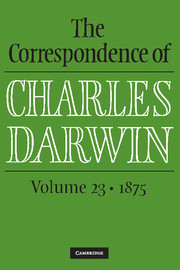Book contents
- Frontmatter
- Frontispiece
- Dedication
- Contents
- List of illustrations
- List of letters
- Introduction
- Acknowledgments
- List of provenances
- Note on editorial policy
- Darwin/Wedgwood genealogy
- Abbreviations and symbols
- The Correspondence
- Appendixes
- Manuscript alterations and comments
- Biographical register and index to correspondents
- Bibliography
- Notes on manuscript sources
- Index
- Table of Relationship
Introduction
Published online by Cambridge University Press: 05 July 2018
- Frontmatter
- Frontispiece
- Dedication
- Contents
- List of illustrations
- List of letters
- Introduction
- Acknowledgments
- List of provenances
- Note on editorial policy
- Darwin/Wedgwood genealogy
- Abbreviations and symbols
- The Correspondence
- Appendixes
- Manuscript alterations and comments
- Biographical register and index to correspondents
- Bibliography
- Notes on manuscript sources
- Index
- Table of Relationship
Summary
Plants always held an important place in Darwin's theorising about species, and botanical research had often been a source of personal satisfaction, providing relief during his periods of severe illness. Yet on 15 January 1875, Darwin confessed to his close friend Joseph Dalton Hooker, ‘I am getting sick of insectivorous plants.’ Darwin had worked on the subject intermittently since 1859, and had been steadily engaged on a book manuscript for some nine months. The pleasures of observation and experiment had given way to continuous writing and revision, activities that Darwin found less gratifying: ‘I am slaving away solely at making detestably bad English a very little less bad.’ The process was compounded by the fact that Darwin was also revising another manuscript, the second edition of Climbing plants, which he hoped to publish in a single volume along with the material on insectivorous plants. No sooner had he completed these tasks, than he took up the revision of another, much longer book, the second edition of Variation. ‘I am merely slaving over the sickening work of preparing new Editions’, he complained again to Hooker on 18 August. Finally, by autumn, he was able to devote more time to research, returning to the subject of cross and self-fertilisation. On 3 October, he wrote with fresh enthusiasm to the new assistant director at the Royal Botanic Gardens, Kew, William Turner Thiselton-Dyer, about the prospect of obtaining new specimens: ‘I have great wish next summer to experimentise on some Marantaceous plant to make out meaning of 2 sets of differently coloured stamens.’ At intervals during the year, Darwin was diverted from the onerous task of writing by various controversies. January saw the conclusion of a long-running dispute with the zoologist St George Jackson Mivart. In April and early May, Darwin was occupied with a heated debate over vivisection, working with scientific colleagues and family members to prepare draft legislation for Parliament. At the end of the year, he campaigned vigorously against the blackballing of a young zoologist, Edwin Ray Lankester, who was up for election to the Linnean Society. The ‘malcontents’ of the Linnean sickened him much more than insectivorous plants. As he confessed to Hooker on 12 December, ‘I have not felt so angry for years.’
In January, the protracted dispute with Mivart came to a close.
- Type
- Chapter
- Information
- The Correspondence of Charles Darwin , pp. xvii - xxviiiPublisher: Cambridge University PressPrint publication year: 2015



